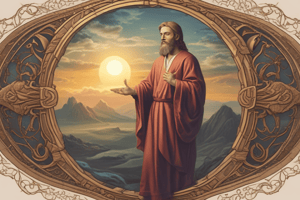Podcast
Questions and Answers
What is the main focus of Christology?
What is the main focus of Christology?
- The ethical teachings of Jesus
- The study of the person and work of Jesus (correct)
- The historical context of Jesus's life
- The development of early Christian theology
Why is it significant for Christians to understand Jesus as both human and divine?
Why is it significant for Christians to understand Jesus as both human and divine?
- It is necessary for the belief in Jesus's salvation of humanity. (correct)
- It emphasizes the importance of faith in the resurrection.
- It explains the nature of sin in humanity.
- It provides a historical framework for understanding the Bible.
How did Christians support their interpretations of Jesus's nature?
How did Christians support their interpretations of Jesus's nature?
- Through personal revelations and experiences
- Through philosophical arguments and debates
- By appealing to historical documents outside the Bible
- By referencing texts within the Bible (correct)
In the passage from Matthew 8:23-27, what did Jesus do during the storm?
In the passage from Matthew 8:23-27, what did Jesus do during the storm?
What reaction did the disciples have after Jesus calmed the storm?
What reaction did the disciples have after Jesus calmed the storm?
What concept describes Jesus as being born human and later 'adopted' by God?
What concept describes Jesus as being born human and later 'adopted' by God?
Who proposed that the human and divine exist in the same person, with the soul acting as a mediator?
Who proposed that the human and divine exist in the same person, with the soul acting as a mediator?
Which council recognized Cyril’s position over Nestorius’s?
Which council recognized Cyril’s position over Nestorius’s?
According to Theodore of Mopsuestia, how should one view the relationship between Jesus's human and divine natures?
According to Theodore of Mopsuestia, how should one view the relationship between Jesus's human and divine natures?
What was the primary theological struggle faced by Theodore of Mopsuestia?
What was the primary theological struggle faced by Theodore of Mopsuestia?
What view did Cyril of Alexandria hold regarding the relationship between the divine and human in Jesus?
What view did Cyril of Alexandria hold regarding the relationship between the divine and human in Jesus?
Which council is viewed as producing the orthodox teaching regarding Jesus’s two natures?
Which council is viewed as producing the orthodox teaching regarding Jesus’s two natures?
What theological stance did the Christians in Nubia, Egypt, and Ethiopia maintain regarding Jesus?
What theological stance did the Christians in Nubia, Egypt, and Ethiopia maintain regarding Jesus?
Flashcards
Christology
Christology
The study of Jesus's person and work.
Jesus's Humanity
Jesus's Humanity
Jesus's human traits and experiences.
Jesus's Divinity
Jesus's Divinity
Jesus's divine nature and attributes.
Jesus's role in salvation
Jesus's role in salvation
Signup and view all the flashcards
Biblical Evidence
Biblical Evidence
Signup and view all the flashcards
Adoptionism
Adoptionism
Signup and view all the flashcards
Origen's Christology
Origen's Christology
Signup and view all the flashcards
Apostolis's View
Apostolis's View
Signup and view all the flashcards
Theodore's Analogy
Theodore's Analogy
Signup and view all the flashcards
Nestorius on Unity
Nestorius on Unity
Signup and view all the flashcards
Cyril's Hypostatic Union
Cyril's Hypostatic Union
Signup and view all the flashcards
Council of Ephesus
Council of Ephesus
Signup and view all the flashcards
Council of Chalcedon
Council of Chalcedon
Signup and view all the flashcards
Study Notes
Christology: Studying Jesus
- Christology is the study of Jesus's person and work.
- It explores how Jesus can be both fully human and fully divine.
- It examines Jesus's role in salvation.
- Christians believe a correct understanding of Jesus is crucial for salvation.
Jesus in the Bible
- Christians use the Bible to understand Jesus.
- Examples like Matthew 8:23-27 describe Jesus's power over nature.
Christology Before the 4th Century
- Adoptionism: Jesus was a human adopted by God at baptism.
- Origen of Alexander: Jesus's human and divine natures coexist, with the soul acting as a mediator.
- Origen's views were dominant until the late 4th century.
Christology in the Late 4th and 5th Centuries
- Significant disagreements led to church councils.
- Apollinaris: Jesus had a divine mind replacing the human mind.
- Theodore of Mopsuestia: Jesus's human and divine natures are separate and distinct.
- Theodore struggled to explain their unity.
- Nestorius: The human and divine natures in Jesus are completely separate, united only by will.
- Cyril of Alexandria: The divine nature is united with the humanity to form one person.
Church Councils and Resolutions
- Council of Ephesus (431): Resolved disagreements, Cyril's council was recognized, and peace lasted 15 years.
- Council of Chalcedon (451): Established the orthodox teaching on Jesus's two natures.
- The council aimed for balance between emphasizing unity and distinguishing the two natures.
- The Council of Chalcedon's teachings weren't universally accepted.
- Some Christians in regions like Nubia, Egypt, and Ethiopia remained loyal to Cyril.
- Other groups, like those in Persia, China, and India, remained loyal to Nestorius and Theodore.
Studying That Suits You
Use AI to generate personalized quizzes and flashcards to suit your learning preferences.


